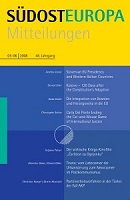Islam und Säkularität in Bosnien und Herzegowina seit 1991
Islam and Secularity in Bosnia and Herzegovina since 1991
Author(s): Armina OmerikaSubject(s): Politics / Political Sciences
Published by: Südosteuropa Gesellschaft e.V.
Summary/Abstract: The paper addresses the relationship between Islam and secularity in Bosnia and Herzegovina on three levels. It starts by examining the role of Islam as an important factor in Bosniak identity politics “from above” since 1991. The debates on the religious foundation of Bosniak ethno-national identity featured prominently throughout the 20th century. After the disintegration of Yugoslavia they have acquired new dimensions and relevance, particularly through the armed conflicts of 1992 and 1995 as well as during the subsequent post-war transformation processes. The second part of the paper deals with the notions of secularity as expressed and developed by explicit Islamic actors, particularly by Muslim theologians in Bosnia and Herzegovina during the past decade. While they borrow from Western European experiences and historical conceptions of secularity, these concepts are at the same time justified by religious reasoning and through references to Islamic theological and legal conceptions of history and interpersonal relations. Finally, the paper briefly looks at the way new religious actors, such as faith-based organizations, challenge the established understanding of the concepts of “public” and “private”. They bring a new impetus to the post-Socialist process of negotiating secularity within the framework of a civil society.
Journal: Südosteuropa Mitteilungen
- Issue Year: 2013
- Issue No: 06
- Page Range: 6-19
- Page Count: 14
- Language: German
- Content File-PDF

